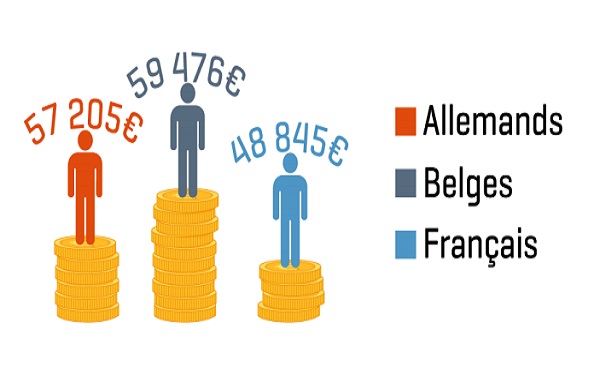 Salary differences according to origins;
Credit: Statec
Salary differences according to origins;
Credit: Statec
In a recent report by Statec, the Luxembourgish statistical agency, French cross-border workers in the Grand Duchy earned €8,000 to €10,500 less per year than their German and Belgian counterparts in 2018.
In 2018, Luxembourg, which has the third highest number of cross-border workers in Europe (after Switzerland and Germany), spent €11.5 billion on the remuneration of incoming cross-border workers. On the other hand, the Grand Duchy received some €1.6 billion from outgoing cross-border workers.
Between 2005 and 2018, the number of cross-border workers in Luxembourg rose by an average of 3.7% per year; the financial crisis of 2007-2008 seemed to have little impact on this development. In addition, the last two years have seen this number increase at an evermore accelerated rate: the number of cross-border workers was up 3.9% in 2017 and up 4.5% in 2018.
Despite the fact that most cross-border workers during this period came to Luxembourg from France (52%), this group received an annual salary that was approximately €10,500 lower than that of Belgian cross-border workers and almost €8,300 lower than those coming from Germany. This gap partly results from the specialisation area of certain sectors with different salaries. For instance, compared to their Belgian and German counterparts, French cross-border workers dominated lower-paid jobs in the hotel and catering sectors as well as working in shops. Moreover, this group tended to be younger than those coming from Belgium and Germany. On average, French cross-border workers earned an annual salary of €48,845, whilst Germans earned €57,205 and Belgians earned €59,476 per year.
Moreover, the number of retired cross-border workers in general remained relatively low compared to that of active cross-border commuters.
Similarly, the number of outgoing cross-border workers, i.e. those moving from Luxembourg to a neighbouring country for work, was significantly lower than that of incoming workers (192,070 in 2018). In fact, of the 12,783 outgoing workers last year, only 1,501 commuted to France, Belgium or Germany for work. The remaining 88% were working for international or European institutions.








